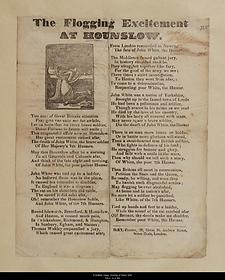Cases
Coroner Thomas Wakley and the Hounslow incident
The exposure of the circumstances surrounding Private John White's death at Hounslow Barracks in 1846 scandalized the British public. At the first inquest, the coroner's jury, upon hearing the testimony of a military surgeon, ruled that White died from natural causes. But Thomas Wakley, coroner of Middlesex, convened another inquest. That investigation found that White's death was caused by the 150 lashes he received. The re-opening of the case received much notice in the British press, where it was cited as a vindication of the argument that justice could only be served if coroners were democratically-elected, medically trained, independent and fair-minded. Public uproar over the killing of John White eventually spurred the reform of Great Britain's military disciplinary codes: White was the last British military man to suffer death by flogging.
Definition
Coroner's inquest: The inquiry or investigation as to the cause of death, held by the coroner's court, a tribunal of record, consisting of the coroner and jurors (the coroner's jury). From ancient times, the coroner was asked to undertake an investigation "upon a view of the body." Before the 20th century, this view was sometimes held at the site of the body's discovery, or in a public meeting place such as a tavern.
